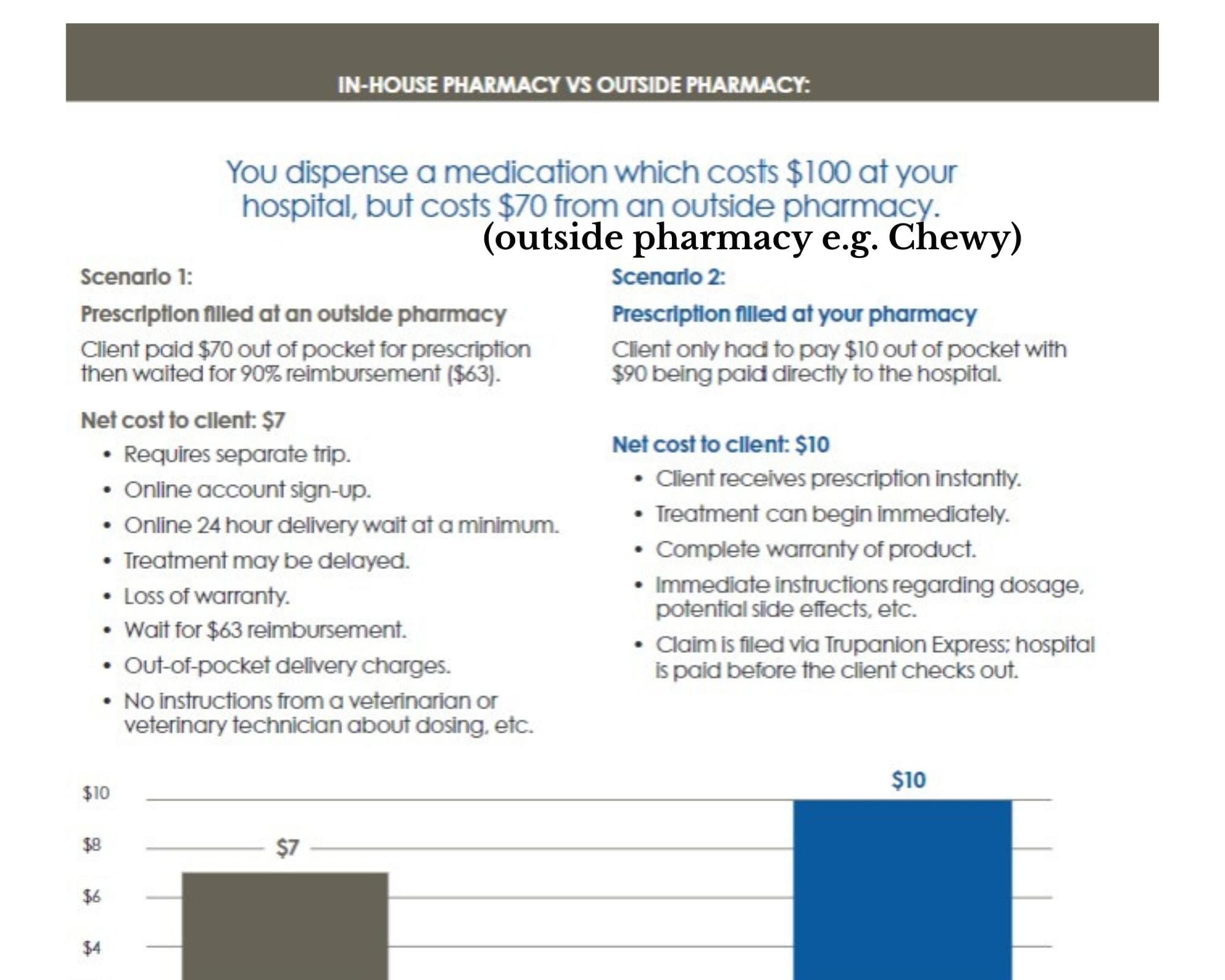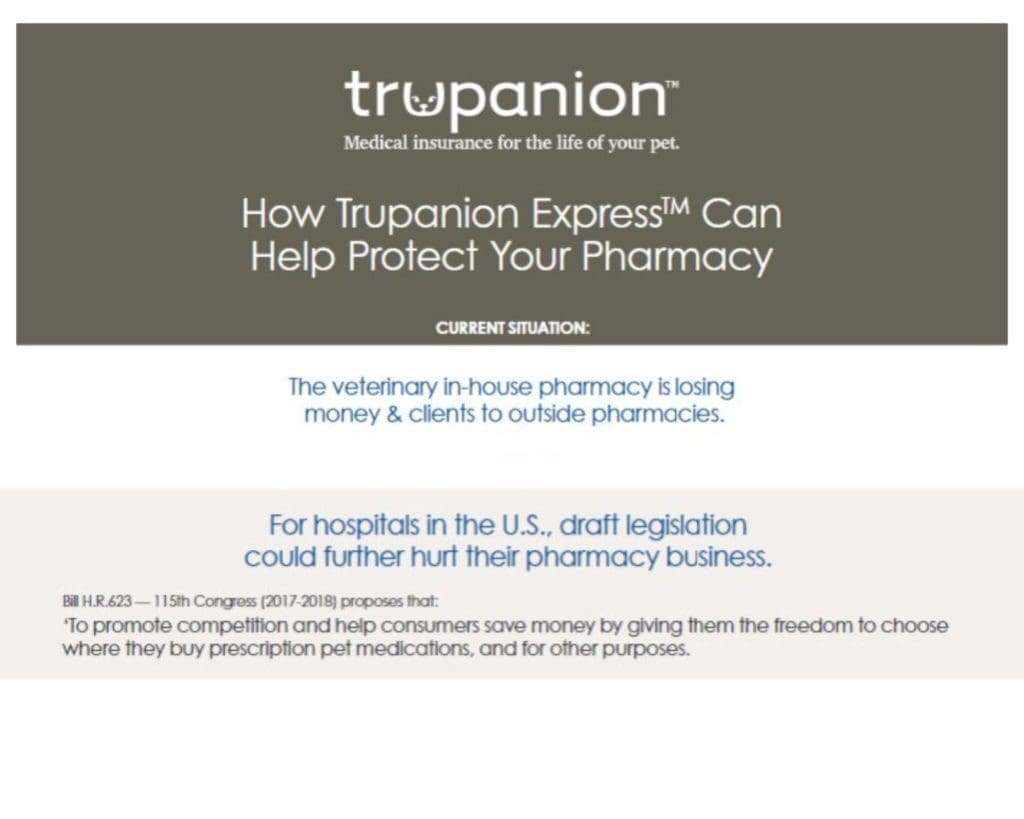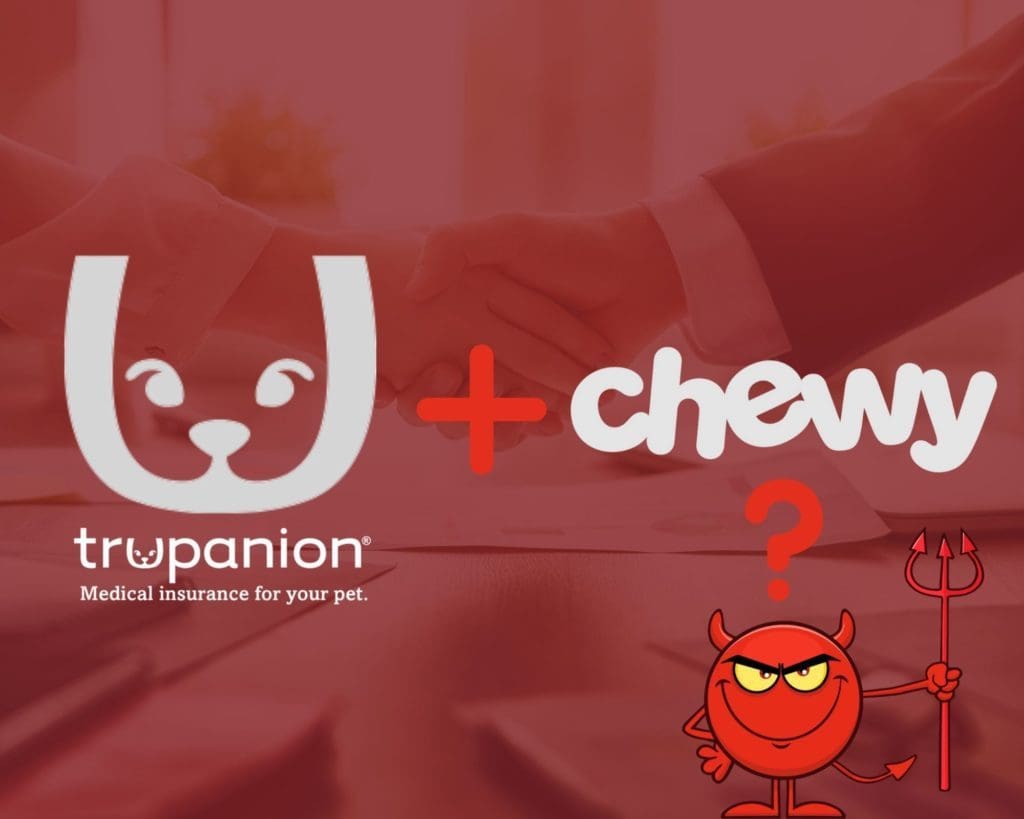Trupanion’s Deal With The Chewy “Devil”: Veterinary Medicine’s Savior Or Insurance Industry Sellout?
On December 7, 2021, Trupanion, Inc. (NASDAQ: TRUP), the “medical insurance for pets” provider announced a partnership with Chewy, Inc. (NYSE: CHWY), the online retail giant many veterinarians perceive as the enemy. Details were vague in the December announcement, but we know more now. Chewy’s reach, Chewy’s branding, and Chewy’s ecosystem will sell ‘Trupanion-powered’ insurance. For the past six months following the December announcement, The Canine Review has been following the “soft-launch” – as Tooth called it recently – of the new Chewy-branded, “powered by Trupanion” insurance products and pressing Trupanion’s leaders on larger implications of the partnership. We’ve also been talking to some of Chewy’s harshest critics in veterinary medicine about whether learning of a Trupanion partnership changes their perception of Trupanion.
Chewy sticks with ‘devil’ persona
And, here, we should note the first major contrast our reporting found between the two companies: For its part, Chewy seems to be sticking with its “devil” persona when it comes to the press – unlike its new partners at Trupanion whose leaders seldom shy away from the press. No official at Chewy, including CEO Sumit Singh, or communications chief Diane Pelkey, would respond to TCR’s phone and email requests for comment for this story, including specific questions about Chewy’s relationship with veterinarians. Chewy officials also would not comment when asked about specific criticisms waged by veterinarians.
Contrastly, in the hours following the joint release announcing the new partneship, Trupanion’s chief product officer, Dr. Steve Weinrauch, whom colleagues call “Dr. Steve,” insisted that more Trupanion-insured pets could be key to alleviating the crisis – the “moral distress” – facing the veterinary profession.
“There is nothing that is out of alignment here,” Dr. Steve said. “In fact, I’m going to double down,” he added. He explained that pet owners who bought insurance through Chewy would be able to use Trupanion’s software, which would preclude them from leaving the veterinary hospital for medications since Trupanion would presumably be covering at least a portion of the cost (although in the Chewy products, there is a considerable range of coverage options) at the point of sale.
“Think about access to care.. Chewy has 21 million members. Imagine what it would look like if all of them would be able to go to any vet that they chose, anywhere across North America. We pay their bill in seconds…before they even leave the hospital. At the time of invoice, we pay their bill in seconds. That’s good for the entire veterinary ecosystem, period.”
Here, we should note a caveat. Yes, the Chewy products will have access to Trupanion’s software that allows payment in real-time, but Trupanion has a lot of work to do in that department. The company’s software, which is its greatest competitive advantage, is only available in about 1/5 of all veterinary hospitals in the U.S., the sum total of which is estimated between 28,000 and 32,000 according to the AVMA, and of that, the extent to which the hospitals are actually using the software varies. TCR will have more on this later in the year.
Trupanion Loves Vets — Who Hate Chewy
Chewy spent the better part of 2021 embroiled in legal battles with veterinary hospital vendors Vetcove and Covetrus, with Chewy as the Goliath to be sure, yet Vetcove and Covetrus are established, trusted veterinary industry brands that provide practice management software to hospitals.
When Chewy sued the vendors, Covetrus saw an opportunity.
“‘To Our Veterinarian Partners,’ Covetrus wrote. “The relationships you build with pets and their owners are essential to their health and well-being, and any effort to cut you, the trusted medical provider, out of those relationships or to mute your voice should be met with an urgent rebuke. We are writing today to inform you that online retailer Chewy, Inc. is engaging in a legal maneuver to do just that. Chewy recently filed a lawsuit against Covetrus that seeks to block veterinarians from communicating with your own clients who have placed orders with Chewy for pharmaceutical or regulated products. This lawsuit is the latest move by Chewy in an aggressive business strategy to erode veterinary care and financially damage veterinary practices, especially amid a pandemic-surge of pet ownership. Covetrus is fighting back aggressively, for veterinarians, your practices, especially amid a pandemic-surge of pet ownership. Your Covetrus representative continues to be ready to assist you….”
So, to many in the industry, especially veterinarians, Trupanion’s embrace of Chewy would seem confusing, to say the least.
Here’s how Trupanion has always positioned itself as the veterinarians’ bulwark against retailers who try to lure pet owners to buy their medications and other services from them instead of from their healthcare providers. In an October 2017 press release, Trupanion, the country’s second largest pet insurer drew a line in the sand:
“With the proliferation of big box store and non-pharmacy based pet pharmacy services, Trupanion (Nasdaq: TRUP) continues to stand apart from the rest of the pet medical insurance industry by encouraging pet owners to buy pet medications directly at their veterinary hospitals.”
Consistent with that stance, Trupanion’s pitch to veterinarians has always been about the company’s special relationship with them — and how the company’s model is uniquely beneficial to the profession. There are even power point-like presentations available in a sub-section of Trupanion’s website intended for veterinarians interested in understanding why they should trust an insurance company — or at least this insurance company — enough to allow access to practice management data, not to mention trust an insurance company enough to refer clients.


Trupanion’s software, the company argues, is the way veterinarians can and should fight back to keep revenue that would otherwise be lost to outside pharmacies.
“By removing the financial barrier to care, we’re also removing the barrier to your pharmacy. Eliminating the need for your clients to price shop pet medication, leads to pet owners buying from you directly and results in an increase in your pharmacy sales. In fact, when looking at the average of all hospitals using our software, 90% of Trupanion-covered prescriptions are bought directly from the veterinarian.”
But Chewy seems out to eliminate those margins altogether when it comes to medications and other services. So how can a Trupanion-Chewy partnership be anything but a threat to veterinarians?
Only Chewy members and “guests” within the Chewy ecosystem will encounter the products, Trupanion’s Tooth explained. In other words, a veterinarian who recommends Trupanion to clients doesn’t need to worry that a client is going to go on Trupanion’s website and buy a Chewy plan.
(Again, it would have been helpful to get Chewy’s view of this separation of brands, but the company refused multiple requests to comment.)
“Powered by Trupanion,” “Chewy-branded” –
No Data For Chewy
Trupanion’s leaders were forthright on another issue veterinarian Dr. Lisa Miller raised. Speaking to TCR in December in the days following the announcement of the deal, Dr. Miller said her chief concern was whether Trupanion intended to share practice data with Chewy. The answer from Trupanion’s leaders was an emphatic “No.”
Dr. Miller told TCR that if there was not data sharing involved, she couldn’t understand what, then, would be in the deal for Chewy. We asked Rawlings and Tooth exactly that:
“Because we can pay the hospital directly,” Rawlings says, referring to the company’s proprietary software.
“We can pay the hospitals directly, that’s a net benefit for the hospital, better than a reimbursement model. That’s kind of where we leverage it. So, we can tell people if you have a product that’s ‘powered by Trupanion, it means you can pay your hospital directly.”
“You have a new school of thinking, which is that products are powered by Trupanion,” Tooth added. “And what that means is, it gives access to our ability to pay the vet directly, 24/7 customer care, and the ability for us to help educate the hospital team…So Chewy products are not coming out looking like Trupanion. They’re not. The backbone of it being able to provide that member experience. And that’s it. Trupanion’s core product doesn’t change.”
Who Insures What
Trupanion, Inc. owns both Trupanion, the core subscription product as well as American Pet Insurance Company, which underwrites insurance for several pet insurers such as Pets Best and, recently, Aflac. Here, it’s important to note that in Trupanion’s partnership with Aflac, the product is Trupanion-branded on Aflac’s website, whereas in the case of Chewy, you will only be able to find “CarePlus” or Chewy pet insurance inside Chewy’s website. There is some mention of Trupanion, but it almost takes effort to find it. Put simply, Trupanion is underwriting the insurance, but Chewy is doing the sales and customer service. The other important way in which there is a Trupanion link is what Trupanion’s leaders believe will make the partnership a milestone in using Chewy’s vast consumer footprint to expand pet insurance and make veterinarians’ practices viable: When a pet owner is at a veterinarian and prepares to pay, Trupanion’s much-heralded vet-hosted software will be used to pay the bill right then and there.
In multiple exchanges with veterinary professionals in recent years, when asked what, if anything, would most immediately address the challenges veterinary professionals face day-to-day, pet insurance is mentioned frequently. In other words, if Chewy’s vast consumer reach results in more pet owners signing up with Trupanion – or even with non-Trupanion, lower-tiered Chewy products still “powered by Trupanion – and these pet owners can immediately have their bills paid through the Trupanion Express software, the Chewy-Trupanion link-up becomes part of the solution, not another setback for the beleaguered profession.
The Vet Crisis
Even as this story was going to press, veterinarians around the country could be heard on social media imploring clients to treat veterinarians with more kindness. In Scarborough, Maine, one of America’s leading veterinary specialty and referral hospitals was forced to jam its phones and take down its website for several days, according to the hospital’s statement, because of a “social media maelstrom” resulting from a report by a local tevision station, “Owner Pleads for Return of Puppy Surrendered Over 10k Vet Bill.”
The veterinary profession is reaching crisis-level workforce supply shortages. Around the country, renowned 24/7 specialty and emergency veterinary hospitals in major metropolitan areas have announced closures or more limited hours, even as the demand for veterinary care has increased sharply, due in part to the pandemic which resulted in more Americans working from home. One in six veterinarians has considered suicide, according to a 2014 cross-sectional survey study of U.S. veterinarians.
In a January 2022 New York Daily News opinion piece, staff veterinarian Indu Mani (Brookline, MA) writes about the high rate of suicide among veterinarians and examines the unique place of “moral distress” in a veterinary professional’s day-to-day life after noting a study showing that pentobarbital (used by veterinarians to perform euthanasia) poisoning is often determined to be the means for suicide within the veterinary population.
“I am always struck by the utter hostility of subverting one of our clinical tools to our own self-destruction,” Dr. Mani wrote. She added:
“Veterinarians dwell in moral distress. We provide subtherapeutic care for pets with wholly treatable diseases. We are requested to perform excessive and clinically unrewarding treatment in the face of a poor prognosis. We have few ethics consultation groups to lean on. We are often asked to perform painful cosmetic and convenience procedures on our patients. We are challenged by individuals who question our Aesculapian authority as veterinarians. We are asked to relinquish, help re-home or euthanize healthy patients. These just encompass a fraction of the ethical dilemmas that induce moral distress in veterinarians.”
Let’s not forget the clients who ask vets to perform their services for free or engage in cyberbullying. There’s no excuse for any of that behavior, but the fact is that veterinarians want insured clients.
“Doubling Down” on “Vet-Centric”
This problem of “moral distress” is the problem Weinrauch was eager to address when TCR started making inquiries about implications for veterinarians following the Chewy announcement. Weinrauch, who recently started a nonprofit initiative called Mighty Vet, said the issue of economic euthanasia is what brought him to Trupanion following a career of owning a network of practices and actively practicing.
Lisa Miller is a relief veterinarian and breeder now based in New Hampshire, but has practiced in three states, including California. Dr. Miller is among a group of veterinarians who have found camaraderie in their shared displeasure for Chewy.
“I have been a longtime supporter of Trupanion,” Lisa Miller told TCR. She added, “I will not continue to support Trupanion if they come on board with Chewy. Chewy does not have the industry best interest at heart. They undermine veterinarians and their client relationships DAILY.”
“I know many of my friends and pet owners love Chewy,” Dr. Miller posted on her Facebook page August 10.
“I want you to understand what they are doing to the pet industry. First of all, they expect us, your veterinarian to drop everything multiple times a day to review charts and prescriptions for them so they can sell you their products at a price below what we often pay for it. We are not compensated for the staff time it takes to pull charts, review records and fax back these prescriptions so you, the consumer, can save a few dollars (sometimes significant, sometimes $1-3) on a prescription….”
In a May 2020 Reddit post that has earned thousands of ‘likes’ and ‘shares,’ an individual identifying himself as a veterinarian explained why he ‘hates’ Chewy: “I don’t necessarily like Walmart, or 1-800-PETMEDS, or Allivet. However, I hate Chewy. My problem is the dishonesty….”
Rightly or wrongly, some veterinarians viewed Chewy’s actions against Covetrus and Vetcove as directed at the veterinary profession. Still, most veterinarians disliked Chewy long before the legal battles. “None of us really like them,” a New York veterinarian who asked not to be named told TCR when asked to characterize the veterinary profession’s attitude towards Chewy.
“Their relationship with the veterinary community is problematic, at best,” veterinarian Matthew Levy of Louisiana wrote about Chewy in a Facebook message board for pet owners and veterinarians in which owners pose their questions to the veterinarians. A pet owner had asked about how veterinarians view Trupanion.
“The issue goes far beyond Chewy/Trupanion,” Dr. Miller told TCR. “We have reached a shift in veterinary medicine and services, and with the corporate takeovers of most of the industry, we have lost our ability to provide the personal service at a reasonably cost that most people desire. Our motivations are different.”
Dr. Miller added in the comments section, “When we don’t respond within an hour or too [SIC], they continue to duplicate fax. It accounts for several hours a day I can’t see patients and we make NOTHING for doing this. Contributes to vet burnout for sure.”

“Although I totally believe in consumer choice, they are hell bent on eroding our industry and I can no longer support them. I am boycotting Chewy and if you care about the future of the veterinary industry, you should too!”
Thus, given how much of Trupanion’s success relies on trusting relationships with veterinarians – after all, veterinary hospitals need to allow Trupanion’s software to integrate with the hospital’s practice management software for the system to work and be able to do claims in real time — Chewy would seem like an unlikely partner.
A Solution, Not A Threat
The problem Rawlings founded Trupanion to solve is much bigger than the wrenching decisions individual families find themselves facing with their veterinarians. The psychological impact of economic euthanasia on veterinary professionals has been unrelenting. Again, one in six veterinarians has considered suicide, according to that 2014 cross-sectional survey study of U.S. veterinarians. Veterinarians today are 2-3 times more likely to die by suicide than the general U.S. population, the same study concluded.
In 2021, Americans spent more than $123.6 billion on their pets, out of which $33.4 billion was spent on veterinary care, according to the pet industry’s main trade group, the American Pet Products Association. Approximately 90.5 million American households are home to at least one cat or dog, or more than 70% of American households yet less than 3 percent of Americans buy pet insurance. Trupanion’s leaders believe that their alliance with veterinarians is the key to changing that – and that the Chewy partnership will not undermine that.
“Trupanion is designed to be recommended by veterinarians or existing pet owners to their friends,” Trupanion’s Rawlings explained. “The Trupanion plan is designed to be very friendly for veterinarians. They don’t have to explain the differences [between A, B, C]. But for Aflac or Chewy, if they want to have variety because that’s more consistent with how they communicate to their customers because they think choices are good, then good for them!”
“We are there to support [veterinarians] no matter what, and that will never change ever,” Trupanion Co-President Tooth told TCR following the Chewy “It would break my heart if anyone ever thought we were doing anything differently because that’s not who we are as a company. Everything we do is dedicated to what [veterinarians] do as an industry and to support the industry. And us providing more access to care gives greater access for vets to be able to treat pets the way that they decide to treat them.”

